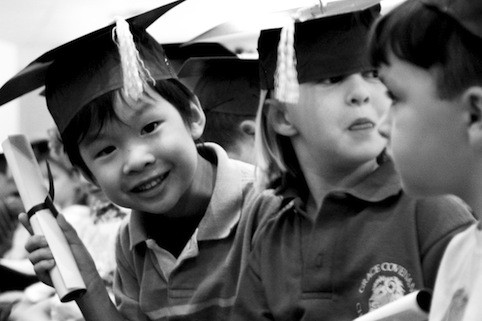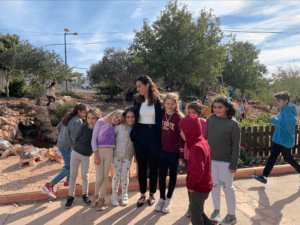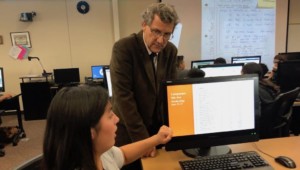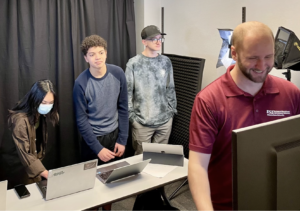When Second Graders Go To College

This August, instead of spending the month labeling cubbies and refreshing my “first week” lesson plans, I’m sending “bon voyages” to a crew of former second graders from Milford South/Pattison Elementary who are off to college.
Thanks to the wonders of Facebook, somewhere between second grade and high school graduation, several of my former students have found me over the years. They’re always tickled that I’m cool with being called “Carri,” and I’m always tickled that they have such happy memories of their year with me. It’s been fascinating to watch them transform from 7 year olds to 17 year olds – with a decade of moments and milestones captured online.
Coincidentally, this particular group of kids was learning how to “carry the 1” under my tutelage while Mark Zuckerburg was inventing Facebook. We’ve heard a lot about them, the millennials, and we’ve assumed a lot about them, too.
I caught up with three of my former second graders who are off to college this year to find out what’s new, what’s next, and what it feels like to be a “digital native.” My conversations with them over email and Facebook challenged some widely-held assumptions and confirmed others.
On Transitions
Not surprisingly, my admittedly very unscientific sample of graduates share many of the same characteristics of graduates since diplomas were created. They’re both excited and nervous about moving beyond high school friends. They’re facing big life questions about who they are, where they are going, and how they are going to get there. For the students I interviewed that “going to get there” part begins with college this month.
Caily is excited to break from her high school family, meet new friends and become more independent – a perfect complement to the fears about getting good grades, leaving her family and being out on her own. Kelsey feels mentally-prepared for the challenges of independence but worries about the financial realities of taking on college debt. Zach sees the whole experience as an opportunity to take the “next big jump.”
On Teachers
When I asked the students about their favorite teachers in grades K-12, I wasn’t surprised to find descriptions like interactive, wise, silly but also stern on the list of top teacher traits. I was also not surprised that all of the students mentioned some version of personal connection as an important trait. For Caily it was the great advice based on life experience that she received from her 4th grade teacher and her 8th grade French teacher that sparked her initial interest in languages. For Kelsey it was the teachers who made up stories and connected to real-world examples to make learning more meaningful. To Zach, the teachers who added their own personal touches to teaching made learning more fun.
When it came to our conversation about teachers, what surprised me the most was how the students each mentioned the importance of being treated like individuals, like people and like young adults by their teachers. This stopped me in my tracks a bit and left me thinking about all the ways we, as teachers, need to create opportunities to recognize and appreciate the individual learners in our care.
On Technology
Those of us who work in the edtech space know just how much assuming goes on about what today’s teachers and students want and need. I enjoyed touching base with students who spent second grade with a once-weekly trip to the computer lab and a couple of overheating classroom computers with the internet blocked who graduated a decade later with the world, opened up mobile technology, at the fingertips.
Even though their feelings on technology ranged from “I honestly hate it” to “I have loved growing up in the digital age,” all of the students acknowledged that it’s hard to imagine life, and education without it. Caily, who would take a tent over an ipod, said “I don’t think I would be where I am without technology.” Kelsey says technology has given her “so many cool and inventive opportunities to learn.” She described classroom applications of technology, such as measuring temperatures and simultaneously graphing them on her laptop in real time.
Their praise for educational technology was tempered by an acknowledgement of the challenges it presents, and I’m glad they gave it to me straight. They raised concerns about relying too heavily on technology to communicate with one another and worried that too much technology would hinder development of social skills. And, this just in, we’re not fooling them. They have no interest in “technology for the sake of technology” and they don’t appreciate being forced to use it. They appreciate opportunities to use technology to improve and enhance their learning, but diversification matters. They favor rich edtech experiences that allow for creativity, not another slideshow presentation or blog that’s really just the same boring paper uploaded to a website.
On Tomorrow
Maybe students don’t think we’ll remember them, but there are dozens of little details about each of my students that I’ll never forget. Recollections of who each of those little people used to be that are echoed by who they are now.
I wasn’t surprised to learn that Zach was the valedictorian of his graduating class. His voracious appetite for learning was obvious even in the second grade version of himself. Science was one of my favorite subjects to teach, and Zach was one of the students who made it so fun. My little scientist is off to study chemical engineering at Vanderbilt. Caily’s twin goals of traveling the world and soaking up its languages make perfect sense looking back to her curious, creative and contemplative nature as a kid in my class. She kicked off this goal with a trip to France this summer and recently began her formal studies at the University of Toledo. Kelsey, whose passion for dance dates back to tiny tutus when she was in the single digits, will go onto the Ohio State University where she will study education and perform with OSU Dance Team. She’ll be a great middle education teacher. I know this because she was a teacher among her peers, even as a second grader.
It won’t be long before my last group of second graders graduates high school. Teachers know the weight of this statement. It’s been enlightening and inspiring to watch my former students take their individual leaps into adulthood over the last decade. At the risk of sounding like a saying on the reverse side of an apple mug – as much as we teach them, the real lesson is in what we learn from our students. It’s true. There’s a lot to gain from honoring who students are and who they become as they pass from our classroom and on to the next.
These three students, who were kind enough to spend a chunk of their summer being interviewed by their second grade teacher, offer an important reminder to us all.
This generation wants to build, interact and create. They want to explore the world. They want learning to be meaningful and applied to their real lives. And, above all else, they want options. They want alternatives. They want us to give them an array of tools to show what they know, and they want us to get to know them.





0 Comments
Leave a Comment
Your email address will not be published. All fields are required.